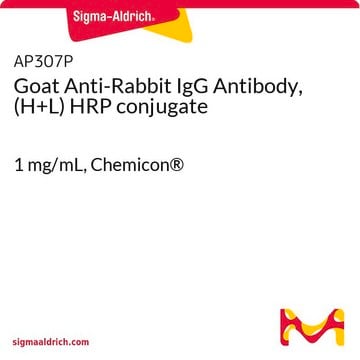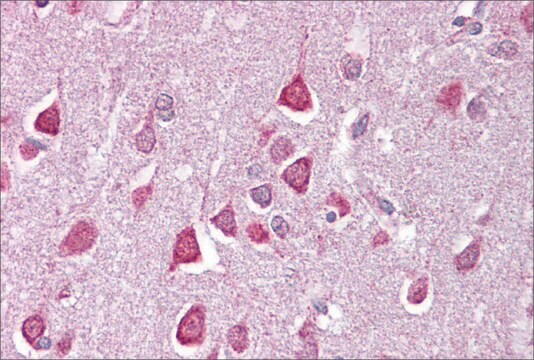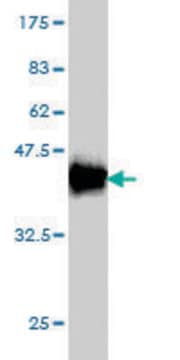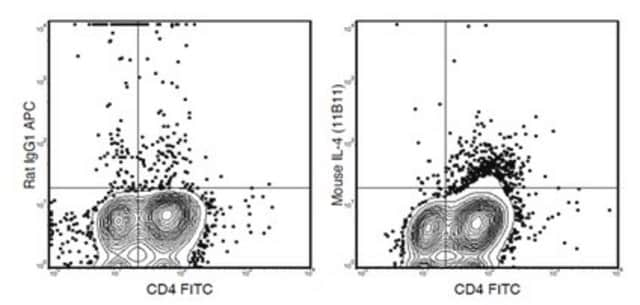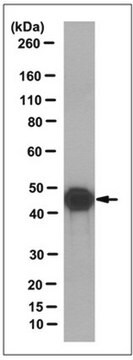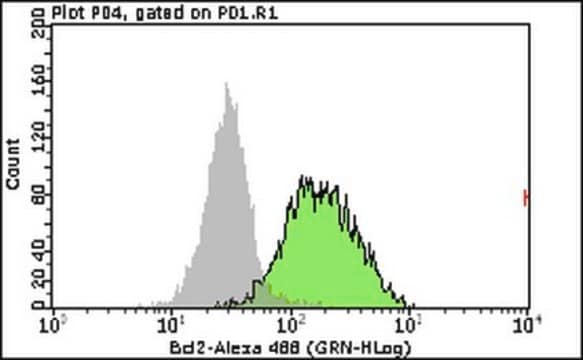MABF1033
Anti-CCRL2 (Mouse) Antibody, clone BZ2E3
clone BZ2E3, from rat
Synonyme(s) :
C-C chemokine receptor-like 2, Chemokine receptor CCR11, G-protein coupled beta chemokine receptor, L-CCR, Lipopolysaccharide-inducible C-C chemokine receptor
About This Item
Produits recommandés
Source biologique
rat
Niveau de qualité
Forme d'anticorps
purified antibody
Type de produit anticorps
primary antibodies
Clone
BZ2E3, monoclonal
Espèces réactives
mouse
Ne doit pas réagir avec
human
Technique(s)
flow cytometry: suitable
Isotype
IgG2aκ
Numéro d'accès NCBI
Numéro d'accès UniProt
Conditions d'expédition
ambient
Modification post-traductionnelle de la cible
unmodified
Informations sur le gène
mouse ... Ccrl2(54199)
Description générale
Spécificité
Immunogène
Application
Flow Cytometry Analysis: A representative lot immunostained liver and lung CD31+/CD146+ endothelial cells from wild-type, but not Ccrl2-/- mice. Intraperitoneal LPS injection prior to cells isolation upregulated surface CCRL2 staining on liver and lung CD31+/CD146+ endothelial cells (Monnier, J., et al. (2012). J. Immunol. 189(2):956-967).
Flow Cytometry Analysis: A representative lot detected cytokines-induced CCRL2 expression on the surface of bEND.3 mouse endothelioma cells. IKKbeta inhibitor BAY (11 7082) and/or JAK-1 inhibitor (sc-204021) inhibited cytokines-induced CCRL2 expression (Monnier, J., et al. (2012). J. Immunol. 189(2):956-967).
Flow Cytometry Analysis: A representative lot immunostained L1.2 mouse pre-B lymphoma cells expressing transfected mCCRL2, but not untransfected L1.2 or L1.2 transfectants expressing mCMKLR1, huCMKLR1, mCRTH2, huCCRL2, or mCCR10, nor non-CCRL2-expressing mouse blood cells. Chemerin, but not CCL2, blocked clone BZ2E3 staining of CCRL2-positive mouse peritoneal exudate cells (Zabel, B.A., et al. (2008). J. Exp. Med. 205(10):2207-2220).
Inflammation & Immunology
Qualité
Isotyping Analysis: The identity of this monoclonal antibody is confirmed by isotyping test to be rat IgG2a .
Description de la cible
Forme physique
Stockage et stabilité
Autres remarques
Clause de non-responsabilité
Not finding the right product?
Try our Outil de sélection de produits.
Code de la classe de stockage
12 - Non Combustible Liquids
Classe de danger pour l'eau (WGK)
WGK 1
Certificats d'analyse (COA)
Recherchez un Certificats d'analyse (COA) en saisissant le numéro de lot du produit. Les numéros de lot figurent sur l'étiquette du produit après les mots "Lot" ou "Batch".
Déjà en possession de ce produit ?
Retrouvez la documentation relative aux produits que vous avez récemment achetés dans la Bibliothèque de documents.
Notre équipe de scientifiques dispose d'une expérience dans tous les secteurs de la recherche, notamment en sciences de la vie, science des matériaux, synthèse chimique, chromatographie, analyse et dans de nombreux autres domaines..
Contacter notre Service technique
